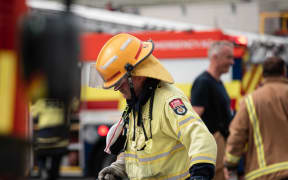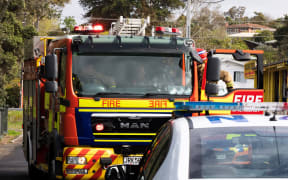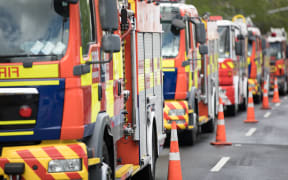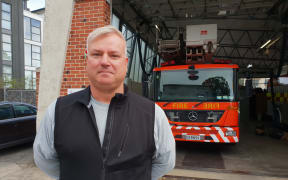The workhorses of the country's fire truck fleet are beset by a new range of mechanical faults.
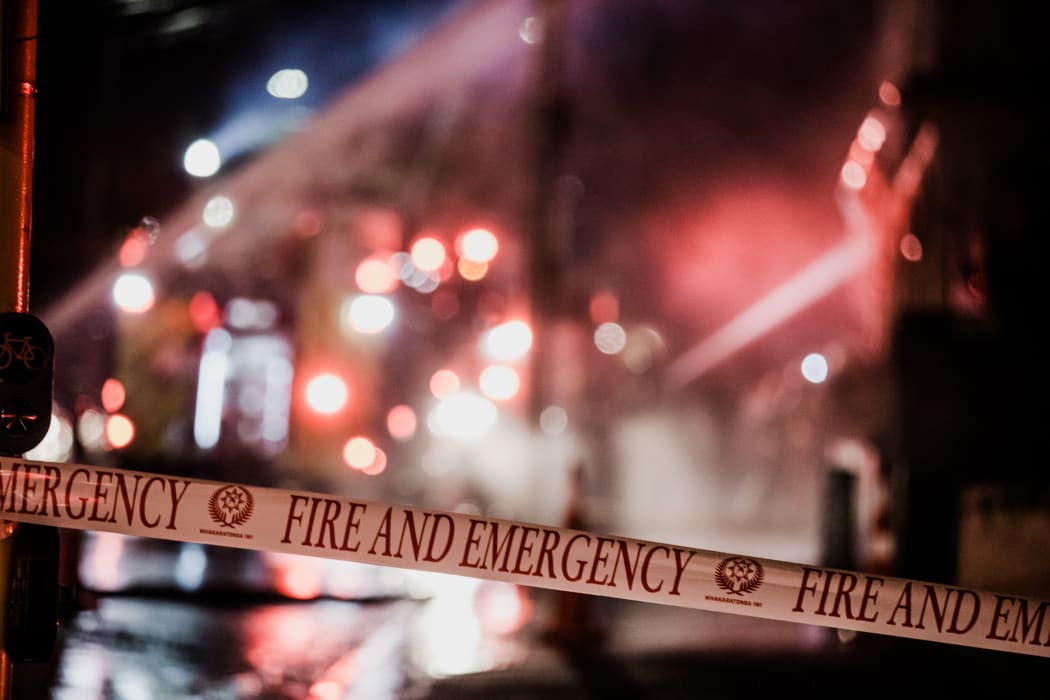
Photo: RNZ / Dom Thomas
At least 27 intercoolers in engines have had to be replaced in the fleet of 47 heavy pump trucks.
Five trucks have had two replacements.
This only covers from 2016-2020, with Fire and Emergency unable to provide the failure figures for the last two years.
FENZ would not say who will pay for the faults, citing commercial sensitivity in its talks with the supplier.
The $500,000 trucks have been plagued with problems since their introduction in 2015 - problems such as rivets coming loose, electronic stability controls activating unexpectedly, and cracks afflicting the subframe of 30 or so trucks before they were even modified to become full appliances.
"We are aware of issues with the intercoolers on some MAN appliances and are working with the supplier to resolve this," deputy chief executive of organisational strategy and capability development Russell Wood, told RNZ in a statement.
The 47 MAN trucks make up about a quarter of the 180 Type 3 workhorse fleet used widely across the country.
The New Zealand Professional Firefighters Union said it was just another example of a "high-risk" fleet management strategy.
"It's starting to play a pretty high-odds game with New Zealanders' lives and livelihoods," said its fleet reference committee representative, Wellington union president Clark Townsley.
"It's definitely affecting fire outcomes."
Wood said when FENZ identified common issues within the fleet "we manage them appropriately".
Manufacturer MAN made the trucks, which were modified in New Zealand. RNZ has approached MAN's agent in this country for comment.
Wood was unable to tell RNZ how many intercoolers have failed since early 2020 without "substantial collation and research, namely manually checking the records for each appliance for references to intercooler issues" - despite at the same time saying the agency had integrated data capture and that "we manage our fleet with more than just an electronic system".
The union secretary in Wellington, Alan Collett, said it was "astounding" an emergency response fleet of this size was being monitored with a paper-based system. This hindered the ability to "identify potential systemic or ongoing fleet problems," he said.
It appeared FENZ had failed to ensure its deal to buy the trucks included a comprehensive warranty, Collett added.
The union blacklisted some of the Type 3s after early problems in 2015-16.
These included the subframe cracks. The cracks are around the steel framing that supports the side-lockers and other external areas of the body of the appliances on bodywork manufactured by a separate supplier and not by MAN.
"Resolving this continues to be a priority. We are making progress with the discussions with our supplier," FENZ said of the cracks.
The union is currently blacklisting two of the bigger 32m-long ladder trucks, called aerials, one of which froze at a fire that destroyed a Wellington house in February.
FENZ's annual report says it spent $22 million on upgrading and buying 52 new trucks in 2020-21.
The union said this went mostly on renewing the rundown rural fire fleet.
FENZ's annual review shows some trucks still carry wooden ladders.
An $800,000 programme to replace them with modern ladders was held up by pandemic-related supply chain disruption.
Its fleet strategy assumes trucks will last 20-25 years.
Staff told a fleet replacement review last year this was "far too long".
"We can't buy parts, the cost is heavy, breakages become harder to fix as the vehicle becomes more out of date," was one 'key comment' quoted.
"There are no rebuilding strategies."
The agency is now looking for new Type 3s, though this has been delayed by the pandemic. FENZ said it would be putting a lot of store on trials being held this year and next for the trucks manufacturers come up with.
"We go out to the market routinely with the aim of getting the best outcomes for our fleet," Wood said.
Collett claimed the agency did not trial the MAN trucks properly before buying them.
Replacement costs are steep, and the 2021 review asked: "Is there a different funding model FENZ could use to roll the appliances over before current end of life?"

